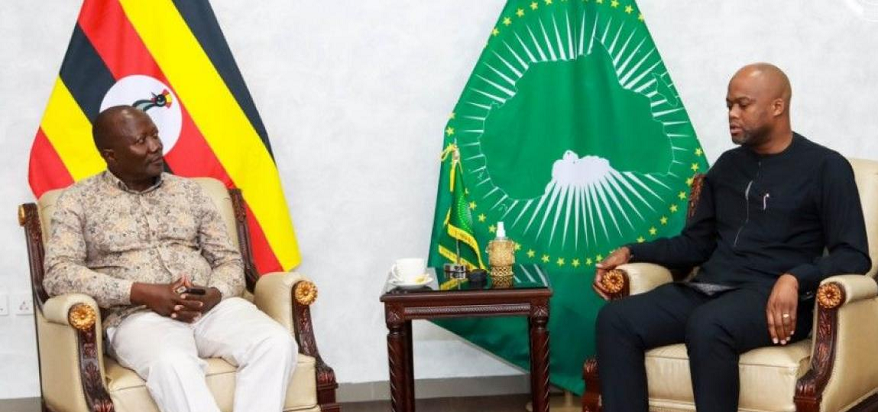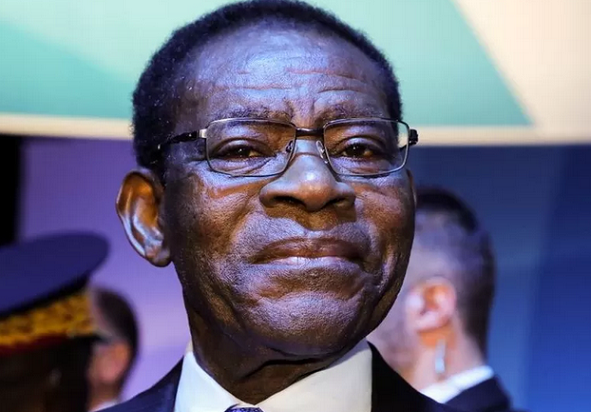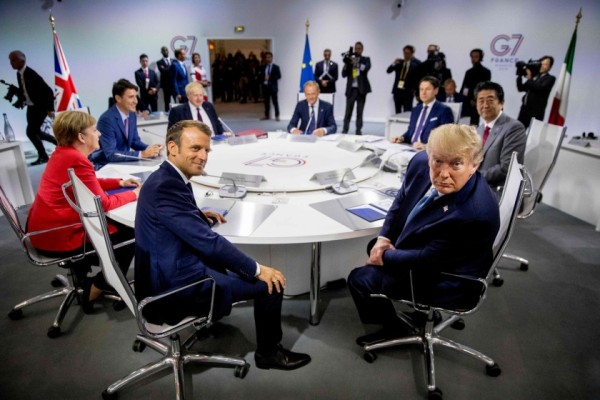Minister Gume (L) meets Mene on Sunday
African countries have commenced trading under the African Continental Free Trade Agreement, AfCFTA, following the launch of the Guided Trade Initiative in Accra, Ghana on Friday.
By October 9th, 54 countries had signed up to the agreement, with Eritrea the only one yet to append her signature, while 44 countries, including Uganda had ratified the deal.
Under the Guided Trade Initiative, GTI, the Secretariat will assist the selected countries to test AfCFTA trading documents and procedures on pre-selected shipments of goods among themselves.
The eight countries include; Kenya, Tanzania and Rwanda from the East African Community, while the others are the Ghana, the host of the initiative, Cameroon, Egypt, Mauritius and Tunisia.
“The Guided Trade Initiative will guide these shipments through customs clearance, including reduced tariff treatment under the AfCFTA in the receiving AfCFTA countries. The AfCFTA chose these countries because their tariff offers on goods have been fully approved and officially published,” says the Secretariat.
Kenya and Rwanda have already traded under the pilot-style initiative, exporting valued added tea and coffee respectively to Ghana.
The Secretary-General of the AfCFTA Wamkele Mene said at least 96 different products from the seven countries could be freely traded under the rules of AfCFTA, including horticultural products, pharmaceuticals, rubber, aluminum kitchenware, sugar, steel, and wooden products. “These products originating from Africa will enjoy duty-free and quota-free trading among the partnering countries,” said Mene. In East Africa, only South Sudan is yet to ratify the agreement. Mene says that most of the state parties (those that have ratified the agreement and deposited the instruments with the secretariat are ready to start trading but there are still issues with some, delaying full commencement of trade.
“There remain a few outstanding issues hampering our collective efforts to facilitate effective trading under the AfCFTA preferential trading regime,” he said referring to the countries that are yet to deposit the instruments of ratification, showing proof that they have incorporated AfCFTA in their national laws.
Others have ratified but are yet to submit their lists of products to trade under the agreement or which will have their tariffs liberalized, the Rules of Origin and trade documents.
At the weekend meeting with State Minister for Trade, Frederick Gume, the Secretary General suggested a roadshow in Uganda for sensitising Ugandans about the AfCFTA, after realizing a big awareness gap. This was part of their discussion of ways to accelerate the implementation in Uganda. He said Uganda has capacity to benefit from the Agreement through “building on its current exports of various agricultural commodities and pharmaceutical products.”
Gume said Uganda would soon join the join the Guided Trade Initiative after fulfilling all the requirements. However, there is still uncertainty over how long it will take Ugandans to be fully prepared to take advantage of the development, as many seem unaware of what is happening.
“It is time to educate the populace, so that they can understand the AfCTA and start making the appropriate preparation so that they can benefit. The Private Sector Foundation Uganda with support from UNDP has started educating business association representatives. This is a wonderful initiative and a big step in the right direction,” said Gloria Omaswa, a researcher and SME business growth advisor.
She says that for the benefit of smallholder entrepreneurs who account for more than 70 percent of the private sector in Uganda, the government should encourage preparation of the exporters under SACCOs, as this will help them cut costs.
One of the contentious issues that had delayed the implementation of the trade agreement was the 0.2 percent levy, with some countries and private sector negotiators opposed to it.
“The 0.2% levy is not in contradiction of others international agreements. In fact, the levy is not new and indeed variations of such levy are already being used by several regional organizations globally, including in Africa,” says the AfCFTA in a statement on their website.
Speaking at Uganda’s independence anniversary celebrations in Kampala, Kenya President William Ruto pointed out the EAC and the AfCFTA regions as vital for the development of the region and the continent.
However, many have condemned the EAC leaders of more talk that work especially when it comes to non-tariff barriers, wondering if the region’s countries will be able to trade with each other under the wider continental trade.
Mene said that “Uganda is a great example of competitiveness and regional integration and exports about 57% of its products to East African member countries.”
-URN





